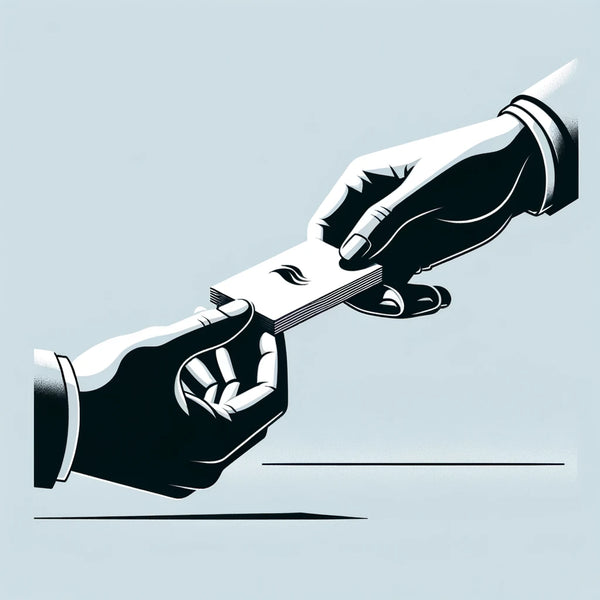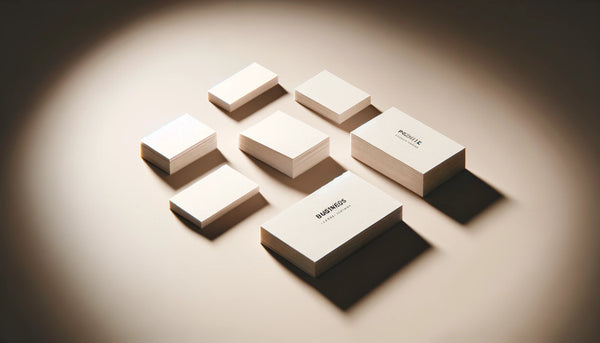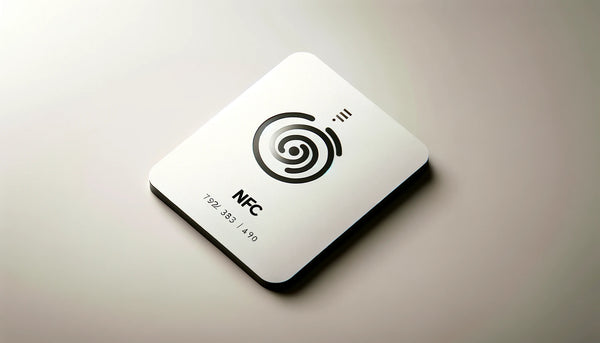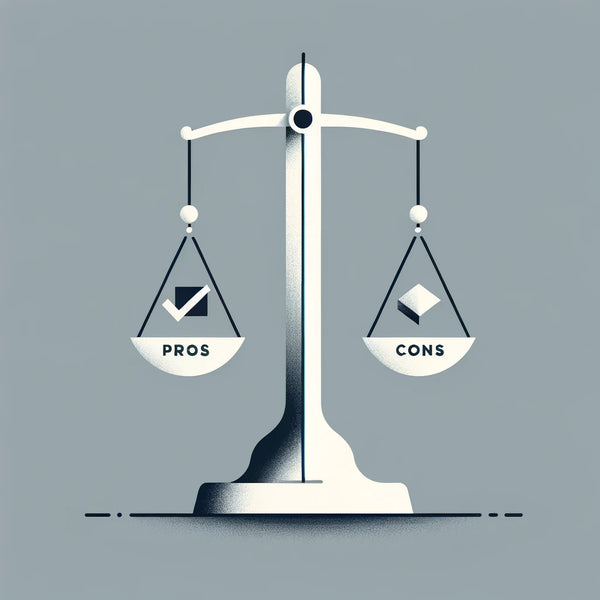Choosing the Right Business Card: Paper vs Digital vs NFC

Business cards may seem like relics of the past, but they still hold a prominent place in the world of professional networking. However, with the advancement of technology, traditional paper business cards are no longer the only option available.
In this comprehensive guide, we will explore the different types of business cards, including traditional paper, NFC, and digital. By considering their advantages and disadvantages, you will be better equipped to make an informed decision for your business card solution.
Comparing Paper, NFC, and Digital Business Cards
It's time to determine which option best fits your needs. Consider your industry, target audience, and personal preferences. If you frequently attend conferences or networking events where physical interactions are prominent, traditional paper cards may still be the way to go.
Paper Business Cards: There's something special about the tactile experience of exchanging paper business cards. The card's weight, the paper's texture, and the design elements all contribute to making a lasting impression. When you hand someone a paper business card, it's a tangible representation of your brand and professionalism. It's a physical reminder of the connection you made, and it can serve as a conversation starter when you follow up with a potential client or partner.
Digital & NFC: Conversely, if you are in a tech-savvy field and prioritize innovation, NFC or digital cards may better align with your brand image. Imagine the convenience of exchanging contact information with a simple tap of your phone. NFC cards allow you to store your information digitally and share it effortlessly with others. With just a quick tap, you can transfer your contact details, portfolio, and even social media profiles, making it easier for potential clients or employers to connect with you online.
Combination of all three: But why limit yourself to just one type of business card? Remember that you don't necessarily have to choose just one. Depending on the situation, you can utilize a combination of paper, NFC, and digital cards to optimize your networking efforts. By offering different options, you can cater to the preferences of your contacts. Some people may prefer the traditional paper card, while others may appreciate the convenience of a digital card. Being adaptable and aware of current trends are key factors in selecting the most suitable business card solution.
Short Summary: Ultimately, the decision comes down to your specific needs and goals. Take the time to evaluate your industry, target audience, and personal preferences. Consider the advantages and disadvantages of each option, and don't be afraid to experiment with different types of business cards. Remember, the goal is to make a memorable impression and facilitate meaningful connections. So whether you choose paper, NFC, or digital business cards, make sure they accurately represent your brand and leave a lasting impact.
Traditional Paper Business Cards: Are They Still Relevant?

Despite the rise of digital alternatives, traditional paper business cards continue to be widely used. They offer a tangible and personal touch, allowing individuals to establish connections with ease. Handing someone your business card can leave a lasting impression, giving your brand a physical presence and making it more memorable. Additionally, paper business cards do not rely on technology, ensuring that your contact information is always easily accessible.
However, paper business cards have their limitations. They require additional effort to carry, manage, and store. In a digital world, physical cards can easily be misplaced or discarded, reducing their effectiveness. Furthermore, they lack the dynamic capabilities of digital cards, making it challenging to update and showcase the latest information about your business.
The Advantages and Disadvantages of Paper Business Cards
![]() Advantage: While paper business cards may have a nostalgic charm, it's essential to weigh their pros and cons. One advantage is their versatility in design. With endless customization options, you can create unique and visually striking cards that reflect your brand identity. Additionally, paper business cards allow for immediate networking opportunities, as you can hand them out during face-to-face interactions.
Advantage: While paper business cards may have a nostalgic charm, it's essential to weigh their pros and cons. One advantage is their versatility in design. With endless customization options, you can create unique and visually striking cards that reflect your brand identity. Additionally, paper business cards allow for immediate networking opportunities, as you can hand them out during face-to-face interactions.
Disadvantage: On the other hand, paper business cards also come with downsides. They can be easily lost or damaged, rendering your contact details inaccessible. Moreover, the environmental impact of printing excessive paper cards cannot be overlooked. As sustainability becomes increasingly important, businesses must consider the ecological footprint of their choices.
NFC Business Cards: What You Need to Know
 Advantage: NFC (Near Field Communication) business cards have gained popularity in recent years. These cards utilize wireless technology to transfer data to a nearby device with NFC capabilities. With a simple tap, you can instantly share your contact information, website, and even social media profiles. NFC business cards offer a seamless and convenient way to exchange details, eliminating the need for physical cards.
Advantage: NFC (Near Field Communication) business cards have gained popularity in recent years. These cards utilize wireless technology to transfer data to a nearby device with NFC capabilities. With a simple tap, you can instantly share your contact information, website, and even social media profiles. NFC business cards offer a seamless and convenient way to exchange details, eliminating the need for physical cards.
Disadvantage: However, widespread adoption of NFC technology remains a challenge. While NFC-enabled smartphones are becoming more prevalent, not all devices support this feature. This limitation hinders the universal accessibility of NFC business cards. Additionally, the cost of NFC cards may be higher than traditional paper cards, making them less accessible to individuals and small businesses.
Why Choose a Digital Business Cards
![]()
Advantage: Like any other option, digital business cards have their pros and cons. One major advantage is the ease of distribution and accessibility. With a virtually limitless reach, you can instantly share your digital card with anyone around the world. Additionally, digital cards are environmentally friendly since they eliminate the need for paper production and printing.
Disadvantage: However, digital business cards face certain challenges. The digital realm is vast, and with an abundance of information competing for attention, digital cards may get lost in the shuffle. Moreover, not everyone may be comfortable with digital interactions, preferring the personal touch of physical cards. While digital cards offer convenience, they may lack the tangible impact of their traditional counterparts.
Conclusion

Choosing the perfect business card solution is not a decision to be taken lightly. Consider the unique aspects of your business, your target audience, and your networking goals. Evaluate the advantages and drawbacks of each option and make an informed choice that aligns with your brand identity and values.
When it comes to traditional paper business cards, there is a certain timeless elegance that can leave a lasting impression. The weight and texture of the card stock, the choice of font and color, and the overall design can all contribute to creating a memorable card. Additionally, the tactile experience of exchanging physical cards can help establish a personal connection in a digital world.
On the other hand, embracing cutting-edge technology like NFC (Near Field Communication) can take your business card to a whole new level. With NFC-enabled cards, you can embed a tiny chip that allows recipients to simply tap their smartphones against the card to access your contact information or website. This innovative approach not only showcases your tech-savviness but also makes it easier for potential clients or partners to connect with you instantly.
But let's not forget the digital convenience that comes with virtual business cards. In today's fast-paced world, having a digital presence is crucial, and a digital business card can help you stay ahead of the curve. With a virtual card, you can easily share your contact details via email, social media, or even QR codes. This flexibility allows you to reach a wider audience and ensures that your information is always up-to-date.
Whichever route you decide to take, remember that the ultimate goal of a business card is to make a lasting impression and facilitate meaningful connections. So, whether it's the classic elegance of traditional paper, the cutting-edge technology of NFC, or digital convenience, choose a business card solution that helps you stand out from the crowd and takes your networking efforts to new heights.




